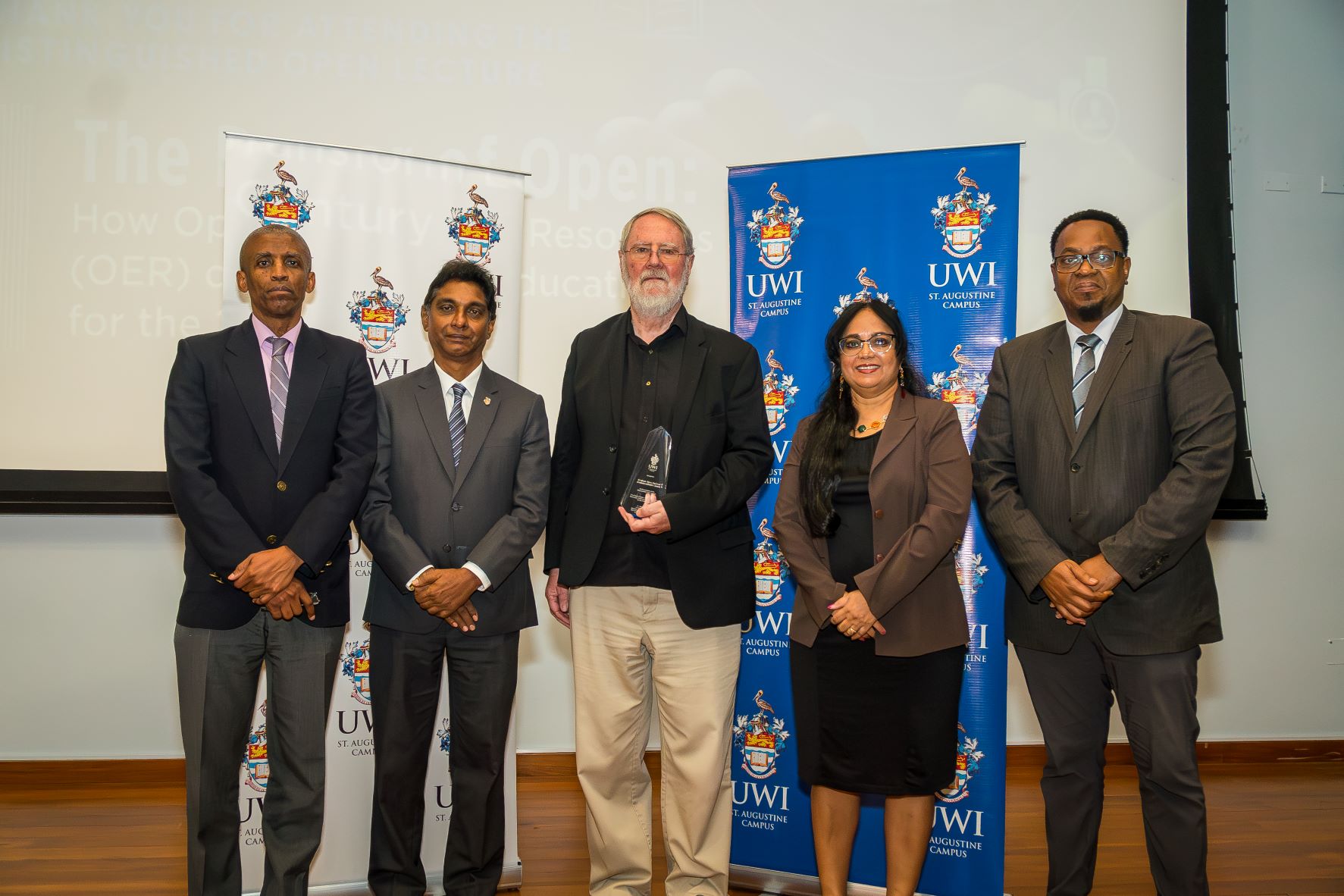News Releases
UWI Advances Open Educational Resources to Empower Students and Reshape Learning in the Digital Age
For Release Upon Receipt - January 23, 2024
St. Augustine

[L-R] Dr Peter Smith, Chief Education Officer at the Ministry of Education; Professor Indar Ramnarine, Deputy Principal of The UWI St Augustine Campus; Professor Rory McGreal, Professor at Athabasca University's Centre for Interdisciplinary Studies and as Chair of the UNESCO/International Council for Open and Distance in Open Educational Resources, Professor Shirin Haque Professor of Astronomy at the Faculty of Science and Technology and Chair of the Open Lectures Committee and Dr LeRoy Hill Director of the Centre for Excellence in Teaching and Learning.
St. Augustine, January 23, 2023 – It was back in 2015 that John Daniel, former CEO of the Commonwealth of Learning, projected that by 2025, 100 million students eligible for higher education would be unable to access it. Highlighting a looming crisis, his words also underscored the urgent need for innovative solutions in delivering education to an ever-growing number of learners. However, Open Educational Resources (OER) can bridge this expansive gap. This is the opinion of Professor McGreal, the featured speaker at The University of the West Indies (The UWI) St Augustine, Distinguished Open Lecture entitled "The Power of Open: How OER can Transform Education for the 21st Century" held at the Teaching and Learning Complex, St Augustine Campus on Thursday, January 11th 2024.
The UWI's Centre of Excellence for Teaching and Learning (CETL) has received funding and support from the Commonwealth of Learning that will enhance the advancement of the Open Educational Resources (OER) framework, propelling the St. Augustine Campus's mission to broaden educational access. OER encompass educational materials that are not only free and openly licensed but also modifiable and shareable by anyone, offering extensive advantages to students and teachers alike.
Speaking as a Professor at Athabasca University's Centre for Interdisciplinary Studies and as Chair of the UNESCO/International Council for Open and Distance in Open Educational Resources, Professor McGreal delivered a compelling presentation on the benefits of implementing OER. He highlighted that the most notable advantage of OERs is the significant cost savings for students. Beyond this, OERs contribute to reducing course costs, enhancing teacher effectiveness, and promoting individualized learning and collaboration.
Professor McGreal further emphasized that OERs' open-tech formats and innovative teaching methods lead to higher-quality content. These resources enable teachers to devise engaging and relevant lesson plans, thereby empowering students with access to materials that meet their specific learning needs. The use of OERs is particularly opportune, offering an innovative response to the escalating costs of traditional textbooks by providing high-quality educational content at little or no cost.
Acknowledging the critical role OERs play in shaping modern society and the opportune timing of the lecture, Professor Shirin Haque Professor of Astronomy at the Faculty of Science and the newly appointed Chair of The UWI Open Lectures Committee, asserted that “the landscape of education is changing faster than we can keep up and we hope that this evening’s lecture on the transformative impact of Open Educational Resources (OER) will open your minds to amazing possibilities.”
Furthermore, as the world embraces the digital age, open educational resources are proving to be a revolutionary force in education as they democratize education by removing financial barriers and allowing equal opportunity for students from all socioeconomic backgrounds to access high-quality resources, ultimately contributing to a more inclusive education system.
The UWI hopes that by promoting the adoption of open educational resources, we can make education more accessible, inclusive, and impactful for students and teachers alike.
End
About The University of the West Indies
The UWI has been and continues to be a pivotal force in every aspect of Caribbean development, residing at the centre of all efforts to improve the well-being of people across the region for over 75 years.
From a university college of London in Jamaica with 33 medical students in 1948, The UWI is today an internationally respected, global university with nearly 50,000 students and five campuses: Mona in Jamaica, St. Augustine in Trinidad and Tobago, Cave Hill in Barbados, Five Islands in Antigua and Barbuda and its Global Campus, and global centres in partnership with universities in North America, Latin America, Asia, Africa, and Europe.
The UWI offers over 1000 certificate, diploma, undergraduate and postgraduate degree options in Culture, Creative and Performing Arts, Food and Agriculture, Engineering, Humanities and Education, Law, Medical Sciences, Science and Technology, Social Sciences, and Sport. As the Caribbean’s leading university, it possesses the largest pool of Caribbean intellect and expertise committed to confronting the critical issues of our region and the wider world.
The UWI has been consistently ranked among the best in the world by the most reputable ranking agency, Times Higher Education (THE). Since The UWI’s 2018 debut in THE’s rankings, it has performed well in multiple schemes—among them including World University Rankings, Golden Age University Rankings (between 50 and 80 years old), Latin America Rankings, and the Impact Rankings for its response to the world’s biggest concerns, outlined in the 17 United Nations Sustainable Development Goals (SDGs), including Good Health and Well-being; Gender Equality and Climate Action.
Learn more at www.uwi.edu
Contact
Marketing and Communications Department
- Tel.: (868)-662-2002 ext.2013/2014
- Email: marketing.communications@sta.uwi.edu

